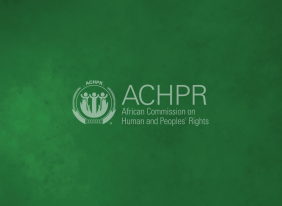Today, 31 July 2013, marks Pan-African Women’s Day. A day set aside to honour and celebrate not only the remarkable achievements of African women, but also to advocate for gender equality in Africa. It is also a day for women and indeed, all Africans to reaffirm their commitment to Pan-Africanism. It is a day for African women to assert their development and extricate themselves from discrimination, conflicts, violence, illiteracy, poverty and diseases, which have sunk deeply through the meat of their progress, and impacted on their development on the continent. As the Special Rapporteur on the Rights of Women in Africa, of the African Commission on Human and Peoples’ Rights ( the Commission), I hereby join other stakeholders, in commemorating this very important day.
It is an unfortunate fact that Africa continues to soak in crises, some of which have resulted to placing women at the back burner. This notwithstanding, women still proof to be achievers by making significant advances, and representing the frontline of liberation. African women continue to empower themselves, and strive for their rights, particularly gender equality, because while Pan-Africanism is a philosophy and movement to unify all native Africans and people of African heritage, it is also aimed at promoting equal rights.
In a bird’s eye view, we recognise Africa’s first female President, Hon. Mrs. Ellen Johnson Sirleaf, elected President of Liberia in 2006; Ms. Wangari Maathai, the first African Woman to win the Nobel Peace Prize and Dr. Nkosazana Clarice Dlamini-Zuma, current Chairperson of the African Union Commission (AUC) who has shown her unwavering commitment in promoting women’s rights and gender mainstreaming in Africa. Accordingly, the leadership of women on our continent is living proof that empowering African women is not just a utopia, but a reality.
This year’s celebration of Pan African Women’s Day, is on a different pedestal because it is garnished by the OAU/AU 50th Anniversary celebrations. Firstly, it is within the framework of the 50thanniversary that the AUC organized a Consultative Conference of Women Stakeholders on Pan Africanism, Renaissance and Agenda 2063, held from 11 to 12 May 2013 in Addis Ababa, Ethiopia. The Conference was aimed at defining and strategizing women’s priorities on Pan Africanism, Renaissance and Agenda for 2063. In the Declaration emanating from the Conference, the critical role played by women in the evolution of Pan Africanism, through their contributions to the anti-slavery, ant colonial and liberation struggles was recognized. The Declaration also underscored the absence of peace and prosperity without the participation and emancipation of African women. In that regard, the Declaration expressed a commitment to promote gender equality, as well as promote, protect and advance women’s human rights, amongst others.
Secondly, the 22nd GIMAC Pre-Summit Consultative Meeting on Gender Mainstreaming took place in Addis Ababa, Ethiopia from 20 to 21 May 2013, and also coincided with the 50th anniversary of the OAU/AU and the 10th anniversary of the GIMAC. To mark its 10th anniversary, GIMAC made a special tribute to African Women Pioneers for their promotion of gender in Africa and their commitment to Pan-Africanism and African Renaissance. The 22nd GIMAC Pre-Summit articulated many salient recommendations, amongst which it called on Members States to implement gender parity as envisaged by the Solemn Declaration on Gender Equality in Africa (SDGEA) by 2020
Hence, 50 years on, there is a consensus on the importance of gender equality, the empowerment/emancipation of women in Africa, and the need to accentuate this fact and prioritize the needs of women on Pan Africanism within the next 50 years, that is, by the year 2063.
As the Special Rapporteur on the Rights of Women in Africa, on behalf of the Commission, and on my own behalf, I call on all stakeholders: Member States of the AU, and civil society organizations, to join the AU in achieving a continent where women and men have equal rights by making economic, social and political adjustments to accommodate this goal.
Africa has been served with enough tools to guide through the process. We have inter alia: the Protocol to the African Charter on Human and People’s Rights on the Rights of Women in Africa, (which I continue to call on Member States of the AU, who have not yet done so, to ratify as soon as possible); the SDGEA; the African Youth Charter; the United Nations Security Council Resolution 1325; and the African Women’s Decade, 2010-2020.
We have the tools, so let us embark on our collective responsibility to make our continent a better place!
Banjul, 31 July 2013









